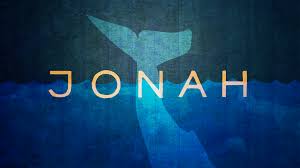Aj – The Word of the LORD came to Jonah: Go to Nineveh and Preach Against It 1: 1-2
The Word of the LORD came to Jonah:
Go to Nineveh and Preach Against It
1: 1-2
The word of the LORD came to Jonah: go to Nineveh and preach against it DIG: What else do we know about Jonah from the TaNaKh? What seems both fitting and surprising about God’s command? What do you think might have been some of the comforts Yonah had to leave behind in Isra’el to follow the LORD’s instructions? Where do we first hear about Nineveh? What is unusual about the name of the city? What kind of a place was Nineveh? What kind of people were the Ninevites? Why might the reluctant prophet not want to preach to those wicked people?
REFLECT: What are some of your life goals that you’ve yet to see become a reality? Has God interrupted your life and seemingly tampered with those goals? How did you respond? Do you trust YHVH with the big decisions in your life? Do you think ADONAI will call you to a life of joy and fulfillment, or a life of rules and misery? Are you always convinced that He has your best interests at heart? Sometimes HaShem sends us into a hopeless place because its there that He can demonstrate His power. Have you felt hopeless lately? Do you have a Nineveh assignment? Did you grow up with a hatred or fear of any group of people? What doesn’t seem to make sense about something God is asking of you right now?
The book of Jonah may be divided into seven scenes. Each scene begins with a short description, then a commentary on that scene, and finally there is a reflection on what the scene as a whole says about God.
Short description of scene one: The story gets off to a fast start in 1:1-3. Scene I introducers the characters (ADONAI, Jonah, the people of Nineveh), gives the locations (Nineveh, Tarshish, Joppa, a ship), sets the tension for the story (What will happen to Jonah and to Nineveh?), and starts the action, as Jonah attempts to run away from the presence of God. The fact that the word Tarshish is mentioned three times in 1: 1-3, and that the phrase: intending to run away from God is mentioned two times, highlight the point of the scene.18
Commentary on scene one: Now the word of YHVH came to Yonah ben-Amittai, which means my true one (1:1). The first word in the book of Jonah in Hebrew is wayehi, “and it happened,” here translated, Now . . . came. This is a typical biblical introduction to a narrative: the books of Joshua, Judges, Ruth, First and Second Samuel, Esther, Nehemiah (1:1b), and Ezekiel all begin in this way. It signals that what follows will be a story.
When the word of God came to Jonah nothing could ever be the same again for him. The word of God didn’t merely instruct him, it enlisted him. Calling is God’s initiative, God’s choice, God’s purpose, God’s instrument, and even God’s witness. Calling and election are not for our amusement or edification, still less our pride, but primarily for God’s purpose. Once the word came, Jonah had to move – the reluctant recruit. Yonah now had faith and a calling, and he didn’t welcome the combination; suddenly infinitely more is demanded of him. Once he was called in this way, whether in disobedience or reluctant obedience, he can’t help but be as salt in the world (see my commentary on The Life of Christ, to see link click Df – You are the Salt of the Earth and the Light of the World) – an agent of saving transformation. And the hardest of all, he had to be transformed himself, even dying in the process. As with many other prophets, each has their own excuse, but eventually each says: Here I am. Send me (Isaiah 6:8b NLT). It just took a little longer in the case of Yonah (3:1).19
Jonah means dove (Genesis 8:8-12; Song of Songs 1:15, etc). Since names taken from animals are not unusual in Hebrew, there need not be any special significance to the name. For example in Hosea 7:11 a dove symbolizes Isra’el.

Jonah son of Amittai (Hebrew: meaning truthful) identifies the main character of the book. This was not the first time the spoken word of God had come to Jonah, for he had already received direct revelation from ADONAI by his prophecy that Jeroboam would expand the borders of Isra’el. That was a near historical prophecy, which was fulfilled shortly after it was given and authenticated Yonah’s prophetic office and calling. Because he was identified with the Jonah of Second Kings 14:25, he was believed to belong to the tribe of Zebulun west of the sea of Galilee (Joshua 19:10 and 13), near the present site of Nazareth.20 This region later became known as Galilee and was in King Herod’s tetrarchy during the time of Messiah. So he would have been a familiar figure to the original readers of his book. Yonah was a contemporary of the prophets Amos and Hosea. Now, after a rather successful and positive ministry in the northern Kingdom of Isra’el, Jonah again received a prophetic message from HaShem, but this time it was of a different nature.
God interrupted Jonah’s life when He said to him, “Get up, go to the great city of Nineveh, and preach against it” (1:2a). Get up is the disturbing instruction that Yonah had to obey. He had no option to stay put, whether he obeyed with ready feet or whether there were heel marks in the carpet. But the destination was appalling – Nineveh. Notice that God didn’t change what He wanted Jonah to do. He had been a prophet to Isra’el; now he was being called to be a prophet to Nineveh. The LORD just altered where and to whom His message was sent. The adjective great normally applied to size, but in this case it applied to the status of the city as a royal capital. That ancient city was notorious for being one of the most godless cities in the ancient world. We can only speculate about the details of how Nineveh affected Jonah, but Isra’el had been brutalized by her archenemy. Nineveh was also a long way away and Jonah was asked to go alone to the Assyrian triangle of three cities of about 600,000 people surrounding, and including Nineveh. Basically, He was asked to walk into the lion’s den. He was asked to be a light piercing the darkness, sacrificing his status, wealth, comfort, security and very possibly his very life for what? The Ninevites?
Since the kingdom of Assyria is prominent in Jonah’s record, we need to review a little of its history and its situation at the time of Yonah. According to the biblical record, one of Shem’s sons was Asshur, and the name Assyria undoubtedly comes from him (Genesis 10:22). It is reasonable to assume that he founded the city of Asshur, which (although it is never mentioned in the Bible) was the first capital of Assyria. Thus, Assur was the founder of Assyria, and the nation is occasionally called Asshur (Hosea 14:3). Assur was also later deified as Assyrian’s chief God.
Nineveh is first mentioned in Genesis 10:11, where it is said of Nimrod that he went into Assyria and built Nineveh. It is on the east bank of the Tigris River (near Al Mawsil or Mosul), about 550 miles northeast of Jerusalem by air, or about 220 miles north of Baghdad. The expression, the great city of Nineveh, designates not only the walled city itself, but also the surrounding region and could be translated greater Nineveh.21 There was the walled city of Nineveh, and then a triangle of three other cities that served as its greater suburbs: Rehoboth Ir, Calah (twenty-five miles to the south) and Resen, which is between Nineveh and Calah – which is the great city (Genesis 10:12). The opening and closing words of the book call to mind the picture of a far-off, sprawling metropolis of ancient times.22
Nineveh was a place of hopelessness. He was to go there and tell the people that they were destined for destruction within forty days after Jonah began preaching to them because their evil had come to God’s attention, literally, before My face (1:2b CJB). The Hebrew word evil has the double sense of wickedness and calamity. In the Hebrew mind the two were closely linked. The Assyrian people subjugated other nations with unusual ferocity and cruelty. However, ADONAI took note of Nineveh’s wickedness and now Jonah was commissioned to preach against the great city. All that happened in Nineveh, and by inference in every other place also, rises up and comes to God’s attention.
The Assyrian king acknowledged that his people’s ways were evil and characterized by violence (Jonah 3:8). They were carefree (Zephaniah 2:15) thinking themselves invincible. The prophet Nahum wrote about several of their crimes (Nahum 3:1, 4 and 16). Nineveh was well known in the ancient near East for the brutal atrocities it inflicted on its captives. For example, writing of one of his conquests, Ashurnasirpal (883-859 BC) boasted, “I stormed the mountain peaks, and took them. In the midst of the mighty mountains I slaughtered them; with their blood I dyed the mountain red like wool . . . The heads of their warriors I cut off, and I formed them into a pillar over their city; their young men and their maidens I burned in the fire.” Regarding one captured leader, he wrote, “I flayed him, his skin I spread upon the wall of the city.” He also wrote of mutilating the bodies of live captives and stacking their corpses in piles.
Shalmaneser II (859-824 BC) boasted of his cruelties after one of his campaigns, “A pyramid of heads I reared in front of his city. Their youths and their maidens I burnt up in the flames.” Another Assyrian king, Sennacherib (705-681 BC) wrote of his enemies, “I cut their throats like lambs. I cut off their precious lives as one cuts a string. Like the many waters of a storm I made the contents of their gullets and entrails run down upon the wide earth. Their hands I cut off.”
Esarhaddon (681- 669 BC) was even more boastful when he said, “I am powerful, I am all powerful, I am a hero, I am gigantic, I am colossal, I am honored, I am magnified, I am without equal among all kings, the chosen one of Asshur, Nabu, and Marduk.”
Ashurbanipal II (669-626 BC) described his treatment of a captured leader in these words, “I pierced his chin with my keen hand dagger. Through his jaw . . . I passed a rope, put a dog chain upon him and made him occupy a kennel.” In his campaign against Egypt, Ashurbanipal also boasted that his officials hung Egyptian corpses “on stakes and stripped off their skins and covered the city wall with them.” No wonder Nahum called Nineveh the city of blood (Nahum 3:1), a city noted for its cruelty (Nahum 3:19). Ashurbanipal was egotistical, saying, “I am Ashurbanipal, the great [king], the mighty king, king of the universe, king of Assyria, the great gods . . . magnify my name, they made my rule powerful.”
The city was also known for its gross idolatry. It had temples dedicated to the gods Nabu and Adad, and the Ninevites worshiped Ishtar, the goddess of love and war. The religion of Assyria was Babylonian in origin but in Assyria the national god was Assur, whose high priest and representative was the king.
After Jonah’s day, Nineveh became the capital of the Assyrian empire under Sennacherib (705-681 BC), the successor of Sargon II (722-705 BC) who destroyed the northern kingdom of Isra’el. It soon became the most powerful city in the ancient Near East. But the Assyrians had become relentless and persistent in their sins. The city of Nineveh fell to the Babylonians, Medes, and Scythians in August of 612 BC.23
We all have things we want to accomplish in our lives – our life goals. But sometimes life gets in the way. My wife had worked many, many years as a nurse with a Bachelors of Science degree. One of her life goals was to earn a Masters of Science degree. Near the end of her nursing career she was enrolled in a Masters program and was at the top of her class (she is ten times smarter than I am). For a variety of health and financial reasons, she needed to complete her degree within that certain window of opportunity. But her mother became very ill and she had to seek the Lord for a decision to either finish her Masters program or take care of her mother. Unlike Jonah, she obeyed the Lord and took care of her mother. But her life was interrupted, and humanly speaking she felt frustrated.
You know the feeling don’t you? The overwhelming frustration that washes over you when you are derailed off your chosen course for just one day, let alone your life goal. The fog of life’s journey can clog our spiritual insight and the fear of the unknown can stop us dead in our spiritual tracks. We planned one thing, and yet our current situation looks nothing like what we had in mind. Sometimes we might even feel that God has tampered with our ambitions, goals, and dreams. The yellow-brick road of our lives veered off in some unexpected direction.
But YHVH graciously gives divine interruptions to His children. He presents us with an opportunity to partner with Him in purposes we could never imagine. A life interrupted by the Lord is a privilege (easier said than done). We must internalize this principle in order to live a life that accomplishes God’s will. He doesn’t need us to complete His purposes, yet He still chooses to ask us to partner with Him. Is that mindboggling or what? His calling means that He has chosen you above everyone else to do what He is asking. You are the one He singled out and appointed as His partner for that particular ministry opportunity.
Some changes we’re delighted with. Others disappoint us and leave us buried in questions. Without a firm belief in the goodness and the care of ADONAI, we can spend years mad at ourselves, mad at others, or even mad at God because we didn’t get to accomplish what we originally set out to do. The importance and priority we’ve placed on our plans cause us to frown on new assignments the Lord may send our way. What other challenges might you face that will make it difficult for you to see God’s interruptions in a positive light?24
Dear Heavenly Father, How wonderful You are! Praise You for Your great love for all the world, so they may know, from the rising to the setting of the sun, that there is no one besides Me. I am ADONAI – there is no other (Isaiah 45:6). You are an awesome father! For you are all sons of God through trusting in Messiah Yeshua. For all of you who were immersed in Messiah have clothed yourselves with Messiah. There is neither Jew nor Greek, there is neither slave nor free, there is neither male nor female – for you are all one in Messiah Yeshua (Galatians 3:26-28). We desire to please You by our loving obedience even when You break into our lives with instructions that upset what we want to do, for we know that You love us and You know and want what is best for us. We look forward to praising Your great name in heaven for all eternity. In Yeshua’sholy name and power of His resurrection. Amen









